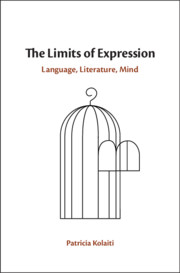Book contents
- The Limits of Expression
- The Limits of Expression
- Copyright page
- Contents
- Acknowledgements
- Introduction
- 1 The Question of Expressibility or How Far It Is Possible to Speak Our Mind
- 2 Language, World and Mind
- 3 The Curse of the Phenomenal
- 4 After Structural Essentialism What?
- 5 Literature as Artefact versus Literature as a Cognitive Object
- 6 Literature as Meaning versus Literature as Experience
- 7 Interdisciplinarity, Theory and the Sciences of Mind
- Afterword
- References
- Index
4 - After Structural Essentialism What?
Implications for the Inadequacy of Language Thesis
Published online by Cambridge University Press: 11 January 2019
- The Limits of Expression
- The Limits of Expression
- Copyright page
- Contents
- Acknowledgements
- Introduction
- 1 The Question of Expressibility or How Far It Is Possible to Speak Our Mind
- 2 Language, World and Mind
- 3 The Curse of the Phenomenal
- 4 After Structural Essentialism What?
- 5 Literature as Artefact versus Literature as a Cognitive Object
- 6 Literature as Meaning versus Literature as Experience
- 7 Interdisciplinarity, Theory and the Sciences of Mind
- Afterword
- References
- Index
Summary
- Type
- Chapter
- Information
- The Limits of ExpressionLanguage, Literature, Mind, pp. 46 - 56Publisher: Cambridge University PressPrint publication year: 2019



